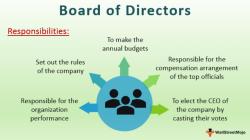What imparts ownership in a corporation?
Ownership in a corporation is imparted through shares of stock, and individuals who hold these shares are referred to as stockholders or shareholders. Here's how ownership in a corporation works:
Shares of Stock: A corporation divides its ownership into shares of stock, which represent units of ownership. These shares are typically represented by physical certificates or electronically through a book-entry system.
Ownership Percentage: The number of shares an individual or entity holds determines their ownership percentage in the corporation. For example, if a corporation has 1,000 shares of stock outstanding, and an individual holds 100 shares, they own 10% of the corporation.
Voting Rights: In addition to ownership, owning shares of stock often comes with voting rights in the corporation. Shareholders may have the right to vote on key corporate decisions, such as electing the board of directors or approving major business transactions.
Dividends: Shareholders may also receive dividends, which are typically cash payments distributed by the corporation to its shareholders as a portion of its profits. The amount of dividends received is generally proportional to the number of shares owned.
Limited Liability: One of the key advantages of owning shares in a corporation is limited liability. Shareholders' personal assets are typically protected from the corporation's debts and legal liabilities. Their liability is generally limited to the amount they have invested in the shares.
Transferability: Shares of stock are often easily transferable, allowing shareholders to buy or sell their ownership stake in the corporation. This liquidity makes it relatively simple for shareholders to enter or exit their investment.
Rights and Benefits: Shareholders may also have certain rights and benefits, such as the right to inspect corporate records, attend shareholder meetings, and receive financial reports.
It's important to note that there are two main types of stock in a corporation:
Common Stock: Common stock represents ownership in the corporation and typically includes voting rights. Shareholders of common stock have the potential to receive dividends, but they are considered residual claimants, meaning they receive dividends after other obligations are met.
Preferred Stock: Preferred stock is another type of stock that may offer specific advantages, such as priority in receiving dividends and liquidation preferences. However, preferred shareholders often do not have voting rights or have limited voting rights compared to common shareholders.
Ownership in a corporation through shares of stock allows individuals and entities to invest in businesses and participate in their growth and success while limiting their liability. Corporations often have many shareholders, including individual investors, institutional investors, and other corporations, each with varying levels of ownership and influence in the company.
What Imparts Ownership in a Corporation? Key Factors Explained
Ownership in a corporation is imparted through the issuance of stock. Shares of stock represent a fractional ownership interest in the corporation. The more shares of stock you own, the greater your ownership stake in the corporation.
There are two main types of stock: common stock and preferred stock. Common stockholders have voting rights and the right to receive dividends, if declared by the board of directors. Preferred stockholders typically do not have voting rights, but they have the right to receive dividends before common stockholders.
Equity and Ownership: Factors That Determine Your Stake in a Corporation
Your ownership stake in a corporation is determined by the number of shares of stock you own and the type of stock you own. For example, if you own 100 shares of common stock in a corporation that has 1,000 shares outstanding, then you own 10% of the corporation.
Unraveling Ownership: The Mechanics of Equity in a Corporation
The mechanics of equity in a corporation are governed by the corporation's charter and bylaws. The charter is the corporation's founding document and sets forth the basic rules of the corporation, such as the purpose of the corporation and the number and type of shares of stock that can be issued. The bylaws are the corporation's internal rules and regulations and govern things like the election of directors and the conduct of shareholder meetings.
When a corporation is formed, it issues shares of stock to its founders and investors. The founders and investors typically pay cash for the shares of stock, but they can also receive shares of stock in exchange for property or services.
Once shares of stock have been issued, they can be transferred to other people. Shares of stock are typically transferred through a stock brokerage firm.
Ownership in a corporation is an important concept because it gives shareholders certain rights, such as the right to vote on corporate matters and the right to receive dividends. Shareholders also have the right to inspect the corporation's books and records and to sue the corporation for mismanagement.













